
I have just received my Ph.D. from the University of Oxford and I am now working as a post-doc with Charlie Cornwallis. For my Ph.D. research, I used birds as a model system to test predictions from inclusive fitness theory about the evolution of cooperation.
Charlie and I will develop some of this work and use phylogenetic comparative methods to improve our understanding of altruism in particular. Why is investing in another individual’s reproduction a better strategy for transmitting genes to future generations than breeding independently? What are the consequences of having altruistic helpers for subsequent evolution? Why do some groups with altruistic helpers transform into superorganisms but not others? Are superorganisms ’individuals’, allowing for adaptation at the level of the group? Hopefully nothing too ambitious!
